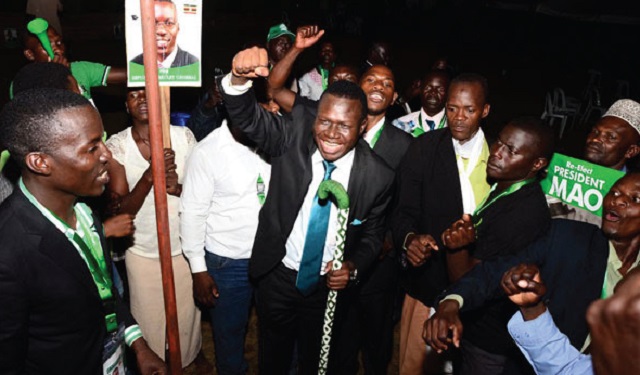
But will big youth wing revival meeting save it?
Kampala, Uganda | IAN KATUSIIME | Uganda’s oldest party, the Democratic Party is organising a revival meeting for its youth wing, the Uganda Young Democrats (UYD) on May 23 in Kampala.
Tadeo Kawuki, UYD Deputy Head of Publicity says they are dusting off and combing through the archives of members to ensure that as many as possible attend. The target is to get more than 1000 members to attend.
The UYD is also already organising several mobilisation meetings; including one they held on May 1 in Nansana. As a main attraction, the party has invited Nelson Chamisa, the president of Movement for Democratic Change (MDC), the leading opposition party in Zimbabwe, as guest speaker.
Below the frenzy, however, is an unstated goal. This is DP President General Norbert Mao’s latest ploy to reinvent himself, if not the party. The 51-year old has been the head of the party for eight years, since 2010. He was re-elected in 2015 and he might not find it easy to avoid another election, possibly in 2020.
To stay on top, he has fought and won many internal battles that have left the party battered and made low hanging fruits of its leaders for the ruling party of President Yoweri Museveni to pick.
Soon after the last national elections, in June 2016, Museveni plucked Florence Nakiwala Kiyingi who was one of the leading young women of DP and had stood for the coveted Kampala Woman MP position in the elections. Museveni made her minister of state for Youth and Children Affairs. Less than a year later, Museveni plucked then-DP national chairman, Muhammad Baswari Kezaala, and appointed him ambassador without posting.
Currently, Mao is battling internal dissent with several members who decamped. Several of them, like the Vice President for Buganda region, Betty Nambooze and Kampala Lord Mayor Erias Lukwago want Mao out. To out-fox them, Mao is clearly attempting to forge new alliances. But the UYD which he is courting has a legacy of radicalism and opposition to the mainstream DP and Mao could find himself holding a tiger by the tail.
As Kawuki told The Independent recently, the UYD leaders admire Mao’s ability to hold the party together in tough times, but they also have their own objectives for the upcoming meeting.
Kawuki, who doubles as chairman of UYD in Mityana district, says UYD has developed a Strategic Plan for 2018-2020 that aims at consolidating the party’s achievements and solving some of its problems.
He says they want money to build Ben Kiwanuka House, named after DP’s leader in the first pre-independence elections in 1962, to house the party headquarters.
“Our aim is to build a stronger party vital in taking leadership of the country,” he told The Independent. “We don’t agree with the mainstream leadership of the party,” he added, “But Mao has achieved a lot. He has done his part; you cannot fail to acknowledge him.”
Kawuki says Mao is likeable because he is open-minded and it is the reason why there is a reconciliation agenda in the works and Kawuki is eager to see the other giants of the party return.
“I can’t wait to see Lulume Bayiga back, Micheal Mabikke,” he muses.
UYD is the glue
For his part, Mao appears to currently relish working with UYD. He says now is the time to harmonise all DP’s warring factions.
“We want to use UYD as the glue we all identify with,” he says. “UYD was the main challenger to NRM, so we want to find out; where did we lose our way?”
He says he sees the reunion as part of the process of DP’s revival.
 The Independent Uganda: You get the Truth we Pay the Price
The Independent Uganda: You get the Truth we Pay the Price






DP died (or became obsolete) on the very table that it was formulated. DP was formed to fight Protestantism that loomed over Uganda’s politics at the time. DP’s interpretation of events in Uganda’s political sphere were further narrowed down to Buganda region and this is where its “fixation” largely relied or so, continues to rely. Benedicto Kiwanuka sought for ways of counteracting the then prevailing political status quo. In founding the Democratic Party, he didn’t only provide himself with the platform to fight the protestant establishment but he also built himself a “pulpit” that made him a “catholic chief.” This put him on a direct collision path with the Kabaka.
When Uganda attained its independence, it somewhat pushed the Kabaka politics and Buganda at the peripheral. Other forces other than Buganda where in the “cockpit” of Uganda’s politics. This meant that DP also had to change its rules of engagement, a fact that has deluded them until today. Incidentally, Norbert Mao highlighted DP’s shortcomings at his first failure of becoming its president general- he referred to it as a “tribal clique.” Hajji Nasser Ssebagala had echoed similar views earlier when he said DP was “centred” at Rubaga Cathedral which also houses the headquarters of the catholic faith.
If DP wants to survive, it must “die” the second time and then “germinate” in a different skin that suits the current political tide. DP must come to terms that it has been in limbo for the last 56 years. DP could pride itself as the oldest political party but that’s only “reliving” history. Reality demands, that a political party should be able to take and, or, retain political power.
The simple formulae for work done is: Work = Force x Distance. DP could have covered the distance of 64miles since its inception (1954) but there is a resounding silence about its absenteeism in matters of national politics. (DP terina work!!!)